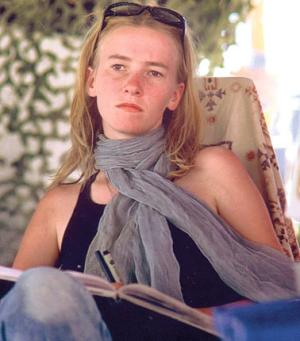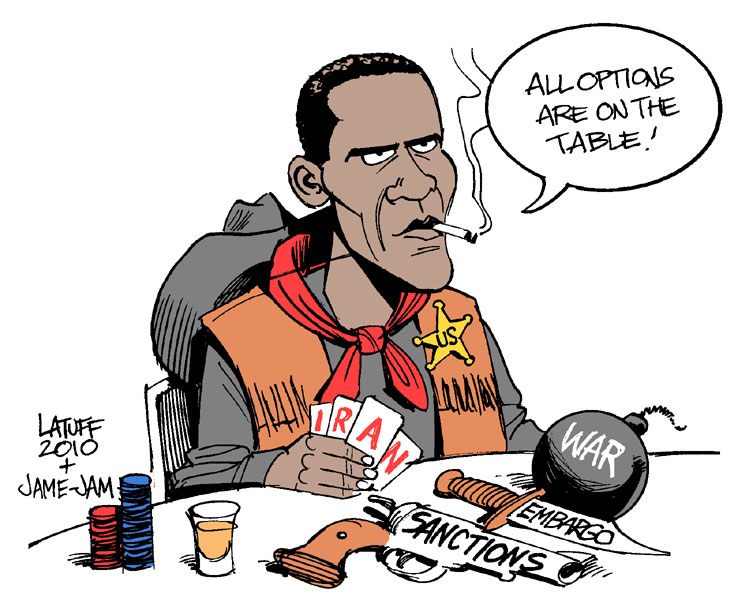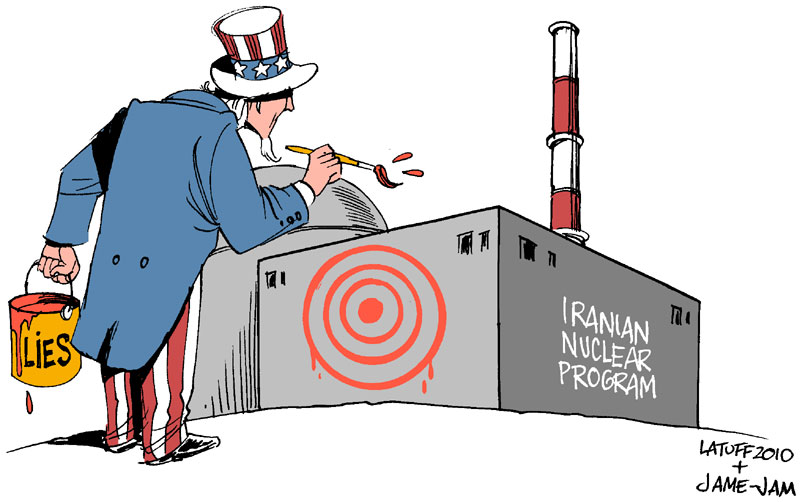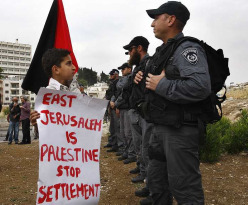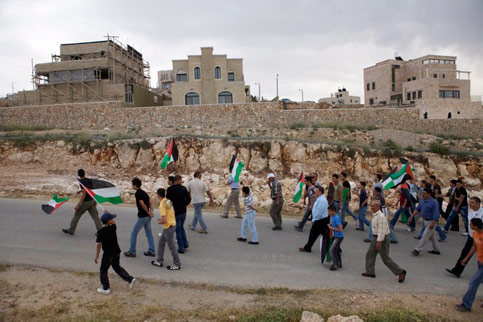New film by Rachel Leah Jones, for Adalah
The film “Targeted Citizen” (15 minutes), produced by filmmaker Rachel Leah Jones for Adalah, surveys discrimination against the Palestinian citizens of Israel. With the participation of experts Dr. Yousef Jabareen of the Technion and Dr. Khaled Abu Asbeh of the Van Leer Institute, as well as Adalah attorneys Sawsan Zaher, Abeer Baker and Hassan Jabareen, inequality in land and housing, employment, education and civil and political rights are eloquently addressed. These interviews are reinforced by the contrasting informality of on-the-street conversations conducted by Palestinian comic duo Shammas-Nahas and punctuated by the hard-hitting rhymes of Palestinian rap trio DAM. The film’s theme song “Targeted Citizen,” written and recorded by DAM especially for Adalah, tells it like it is without missing a beat.
US envoy George Mitchell in Mid-East talks push: BBC
US Middle East envoy George Mitchell has met Israeli President Shimon Peres and Palestinian leader Mahmoud Abbas in an attempt to restart indirect talks.
The meetings come one day before the Palestine Liberation Organisation (PLO) decides whether to proceed with talks.
Talks in March were delayed by a row over building in East Jerusalem. Washington has said it expects the so-called proximity talks within days.
Mr Abbas is to advise Mr Mitchell of the PLO decision later on Saturday.
Middle East peace talks have been stalled since 2008.
Shuttle diplomacy
In Jerusalem, President Peres told Mr Mitchell that Israel was committed to reaching a Middle East settlement, but stressed that the country’s security must be at the top of the agenda of any possible indirect talks.
Later on Friday, Mr Mitchell met Israeli Foreign Minister Avigdor Lieberman and also Israeli opposition leader Tzipi Livni.
He then went to the West Bank to hold separate talks with Mr Abbas. No statements were made after the meeting.
The US envoy, who arrived in the region on Wednesday, has already seen Israeli Prime Minister Benjamin Netanyahu twice.
Mr Abbas has said he wants the backing of the PLO, due to meet on Saturday, before committing to the indirect talks.
After the Arab League backed Palestinian participation in the talks last Saturday, Mr Abbas said he did not “want to lose hope”.
The Palestinians pulled out of talks in March after an announcement that Israel had approved plans for new homes in the East Jerusalem settlement of Ramat Shlomo during a visit to Israel by US Vice-President Joe Biden.
The move caused deep strain in Israeli-US relations.
The Palestinian Authority’s formal position is that it will not enter direct talks unless Israel completely halts building in the West Bank and East Jerusalem.
In November, Israel announced a 10-month suspension of new building in the West Bank, under heavy US pressure.
But it considers areas within the Jerusalem municipality as its territory and thus not subject to the restrictions.
Israel has occupied the West Bank, including East Jerusalem, since 1967. It insists Jerusalem will remain its undivided capital, although Palestinians want to establish their capital in the east of the city.
Nearly half a million Jews live in more than 100 settlements in the West Bank, among a Palestinian population of about 2.5 million.
The settlements are illegal under international law, although Israel disputes this.
Israel needs a new nuclear policy: Haaretz Editorial
The expanse between excessive weaponry and disarmament is not a slippery slope. Israel should enter it.
The Security Council’s permanent members this week reiterated an old call to establish a nuclear-weapons-free zone in the Middle East. The Arab states have no nuclear weapons – and when Iraq and Syria started developing them, the Israel Defense Forces attacked them. Therefore, this call is clearly directed at Israel, which is believed to possess such weapons, though its official position is that it only has a “nuclear option.”
The call was issued at a five-year Review Conference of the Treaty on the Non-Proliferation of Nuclear Weapons, on the 40th anniversary of the treaty’s inauguration. It’s a sad celebration. North Korea has been making a mockery of the treaty for a decade and a half. Another member of the club, Iran, is developing nuclear weapons and challenging the council. Three states – India, Pakistan and Israel – are still refusing to join the NPT, which affords few privileges (such as using foreign nuclear material for domestic needs ) and numerous obligations (refraining from nuclear weapons, agreeing to supervision ).
India and Pakistan have even conducted nuclear tests and make no secret of possessing nuclear weapons. It may be for mutual deterrence, but there is no guarantee that the safety catch will remain on forever.
Egypt, which has always spearheaded demands for the region’s total nuclear disarmament, decided in the 1970s that it was incapable of taking Israel on in the nuclear arena. Anwar Sadat, who indicated when he came to Jerusalem that he chose peace with Israel in part because of the nuclear issue, took the “if we don’t have it, neither shall you” approach.
The peace agreement with Israel has not stopped Egypt from consistently demanding, for more than 30 years now, that Israel be disarmed of its alleged nuclear weapons. This demand is raised every autumn at the International Atomic Energy Agency’s annual conference in Vienna, and frequently in other international forums.
The Arab demand, and the world’s support for it, are nothing new. Nor is Israel’s response. Ever since the days of foreign minister Yigal Allon’s appearances at the UN General Assembly on behalf of Yitzhak Rabin’s first government, Israel has preferred saying “yes, but” to outright rejection. Yes, certainly, Israel would be pleased if a nuclear-free zone were established, but on condition that the region’s borders be defined so that it includes Iran (and Libya, and what about the nuclear weapons that may creep in from Pakistan? ), and that the region no longer be hostile.
In brief, if the Egyptians say that without disarmament there will be no peace, Israel says peace now, disarmament later. What Israel is prepared to give for peace is already a different issue.
However, the periodic demand for regional disarmament is different this time, on two counts: Israel describes the nuclear weapons Iran is expected to acquire as a threat to its survival, and U.S. President Barack Obama is passionately striving for a nuclear-free world, not merely region. In this situation, Israel must adopt a new policy – one that does not go as far as total and immediate disarmament, but does agree to freeze new nuclear activities.
The expanse between excessive weaponry and disarmament is not a slippery slope. Israel should enter it.
PLO convenes to discuss peace talks with Israel: The Independent
By Tom Perry, Reuters, Saturday, 8 May 2010
The Palestine Liberation Organisation (PLO) convened today and was expected to approve indirect peace talks with Israel, clearing the way for the first negotiations in 18 months.
The PLO executive committee, meeting in Ramallah in the Israeli-occupied West Bank, would approve a US proposal for indirect talks which will be mediated by US Middle East envoy George Mitchell, committee members said.
The United States has sought to revive the peace process, calling the Middle East conflict a “vital national security interest”. However many doubt whether the latest US effort can succeed where years of diplomacy have failed.
The United States proposed the indirect talks as a way to break an impasse over Jewish settlement construction on Israeli-occupied land where the Palestinians aim to establish a state alongside Israel.
The United States said last week it expected the indirect negotiations, known as “proximity talks”, to move forward before Mitchell’s departure from the region, scheduled for tomorrow.
Mitchell is set to meet Palestinian President Mahmoud Abbas later today.
“The (PLO) executive committee will approve proximity talks but we are against it,” said committee member Bassem al-Salhi of the People’s Party. The PLO is dominated by the Fatah faction led by Abbas. The Arab League last week approved four months of indirect negotiations.
